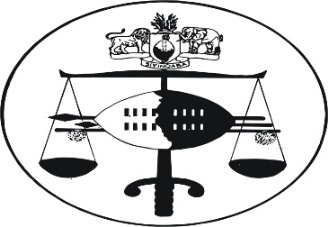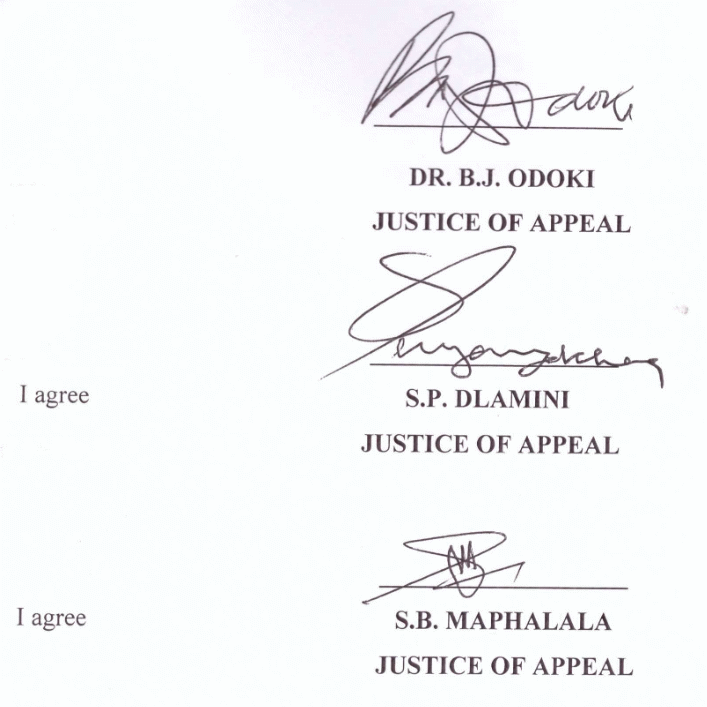
IN THE SUPREME COURT OF SWAZILAND
JUDGMENT
HELD AT MBABANE CRIMINAL APPEAL CASE NO: 06/2017
In the matter between:
THEMBA MUZIKAYIFANI 1st APPELLANT
MNGOMETULU
BHEKI BONGANI KUNENE 2ND APPELLANT
And
REX RESPONDENT
Neutral Citation: Themba Muzikayifani Mngometulu and Another v Rex
(06/2017) [2017] SZSC 37 (10 November 2017)
Coram: DR. B.J. ODOKI, JA
S.P. DLAMINI, JA
S.B. MAPHALALA, JA
Date Heard: 12 September 2017
Date delivered: 10 November 2017
Summary: Criminal Procedure ‒ Appeal against order of High Court refusing to grant bail ‒ Appellants charged with two counts of robbery and one of rape with aggravating circumstances ‒ Appellants raise grounds that they are not a flight risk and are suffering from sicknesses which cannot be managed in custody ‒ Requirement for the 2nd Appellant to prove existence of exceptional circumstances ‒ Appellants’ trials commenced and pending before Magistrate Courts ‒ Appellants’ likely to flee having heard the evidence against them and having not proved any exceptional circumstances. ‒ Appeal dismissed.

JUDGMENT
![]()
DR. B.J. ODOKI J.A
[1] The Appellants appealed to this Court against the decision of the High Court refusing to grant them bail. On 12 September 2017, we heard the appeals and dismissed them. We reserved the reasons for our decision, which we now give.
[2] The Appellants were charged with the offence of robbery committed on 12th August 2016 at Malindza against Calsile Vakashile Lukhele, and stole various items valued at E3, 295.00
[3] The Appellants were also charged in the Magistrate Court at Manzini with the offence of robbery which was committed on 13th August 2016 near Croydon area, against Sibusiso Dlamini and stole various items.
[4] The 2nd Appellant was separately charged with the offence of rape with aggravating factors against the said Lukhele during the course of the robbery against her.
[5] The trials against the Appellants commenced before different Magistrates Courts on different dates, but had not been completed.
[6] On 1st September 2016, the Appellants filed applications for bail before the High Court. The Applications were heard on 23rd September 2016 and dismissed. Reasons for dismissal were given on 2nd December 2016.
[7] In his appeal to this Court, the 1st Appellant (Themba Muzikayifani Mngometulu) raised the following grounds upon which he sought this Court to grant him bail:
(a) That although the offences with which he is charged are very serious, other suspects with more serious offences have been granted bail.
(b) That he will not evade justice when admitted on bail because the Crown did not prove that he was likely to abscond from trial when released on bail.
(c) That he could not travel out of the country because he has no travel document to enable him to cross to the neighboring countries.
(d) That he is a Swazi Citizen born and raised in Swaziland.
(e) That he is a bread winner for his two children and a sister to support.
(f) That he is a sick person suffering from asthma which is made worse by sleeping on the floor while in custody.
[8] In his appeal, the 2nd Appellant, Bheki Bongane Kunene, raised more or less the same grounds as the 1st Appellant. In particular, the Appellant raised the following grounds:
(a) That there was no proof from the Crown that he would evade
trial if granted bail.
(b) That he has no travel documents and therefore he cannot leave
the country.
(c) That he is a Swazi citizen and his parents were buried in
Swaziland.
(d) That he is a bread winner of four children who are lonely and
need his support.
(e) That he is a sick person suffering from piles which are made worse by sleeping on the floor.
[9] In their arguments in court, both Appellants reiterated the grounds they had raised in their Notices of Appeal. They complained that their trials had stagnated since October 2016 although they had been going to court.
[10] Counsel for the Respondent submitted that the court a quo had refused to grant the Appellants bail because the fact that they did not possess passports could not stop them from crossing the border using informal crossings.
The judge a quo also stated that the severity of punishment which might be imposed upon the Appellants could induce them to abscond from trial. Furthermore, the Court a quo held that the 2nd Appellant had failed to show that exceptional circumstances existed which would warrant him to grant the Appellant bail. Counsel relied on the case of Senzo Menzi Motsa Supreme Court of Appeal Case No 15/09 where exceptional circumstances were described as something “unique” and not merely “unusual,” that is “one of its kind.”
[11] Regarding the ground advanced by the Appellant that he was asthmatic, and had had an appendix operation and was sleeping on the floor, Counsel for the Respondent submitted that had the Appellant disclosed these claims in his application, they could have been investigated and considered by the court a quo
[12] Finally, counsel for the Respondent argued that the Court a quo was correct in refusing to grant bail to the Appellants in the interest of justice as there existed a likelihood that the Appellants could evade trial by crossing the border using informal crossings.
[13] The right to personal liberty is protected under section 16 of the Constitution of Swaziland. Therefore a person cannot be deprived of his or her personal liberty except as authorized by law. Thus where a person is arrested or detained on reasonable suspicion of having committed an offence, he or she may be detained in custody. However such a person may be released on bail pending trial upon reasonable conditions imposed by the court to ensure that he or she attends trial, as provided in Section 16 (7) of the Constitution.
[14] It is trite law that bail may be granted at any stage of criminal proceedings. The Criminal Procedure and Evidence Act No 67 of 1938 (CPEA) provides that an accused person who is in custody is entitled to be released on bail unless it is in the interest of justice that such a person should be detained in custody. Section 96 (1) (a) of CPEA provides as follows:
“96 (1) In any Court –
(a) an accused person who is in custody in respect of an offence shall, subject to the provisions of Section 95 and the Fourth and Fifth schedules, be entitled to be released on bail at any stage preceding the accused’s conviction in respect of such offence, unless the Court finds that it is in the interest of justice that the accused be detained in custody.”
[15] Section 96 (6) of the CPEA sets out some of the factors which the court should take into account when considering whether there is a likelihood that the accused may evade trial. These factors include the emotional, family or occupational ties that the accused has with the place of trial, the assets held by him, the travel documents held by him, the nature and gravity of the offence and the punishment likely to be imposed should the accused be found guilty, and the strength of the case against the accused.
[16] The first ground advanced by the Appellants in seeking bail were that they will not evade justice when granted bail. They argued that they are born and stay in Swaziland and have children to look after. They stated that they have no travel documents to enable them cross boarders to neighboring countries. They submitted that other accused person who were charged with more serious offences had been released on bail; and therefore it was unfair to refuse their application for bail
[17] In the court a quo, the learned judge found that the Appellant had failed to show that they had assets, occupational, family and emotional ties which can motivate or persuade them to remain in the country and face the serious offences they have been charged with.
[18] The court a quo also held that informal crossings are accessible to those who want to go outside the country without using passports, and that once Appellants flee they may remain the those countries which do not have extradition treaties with this country.
[19] I am unable to fault the findings and reasoning of the court a quo. The Appellants are charged with serious offences of robbery and rape which carry heavy sentences. The Appellants’ trials commenced, in September 2016 and they have already heard some witnesses who may have given incriminating evidence against them. Therefore, the likelihood of the Appellants fleeing the country when granted bail is very high. It would not be in the interest of justice to release them on bail.
[20] The second ground relied on by the Appellants is that of sickness. However they did not show that their sickness was so grave that it could not be treated or managed within the Correctional Services.
[21] The court a quo held that the 2nd Appellant, who was charged with the offence of rape, had not discharged the burden of proof that exceptional circumstances existed to permit his release. Section 96 (12) of the CPEA provides:
“(2) Not withstanding any provision of this Act, where an accused is charged with an offence referred to:
In the Fifth Schedule the court shall order that the accused be detained in custody until be or she is dealt with in accordance with the law, unless the accused, having been given a reasonable opportunity to do so, adduces evidence which satisfies the court that exceptional circumstances exit which in the interest of justice permit his or her release”
[22] It is well settled that the onus lay on the Appellant to show, or balance of probabilities, that exceptional circumstances exist which in the interest of justice favour his release from custody. See Shonge Bheki v. R 2000 – 2005 S L R 380.
[23] However, exceptional circumstances have not been defined by the statute or courts, and it appears that each case must be decided on its own merits. Counsel for the Crown submitted that exceptional circumstances must mean something “unique” or “one of its kind” and not merely “unusual.”
[24] In the present case, the 2nd Appellant was not suffering from some unique sickness which was grave or terminal which could not be treated or managed within the Correctional Services. There was nothing unique about having responsibility for young children. Therefore, the court a quo was justified in holding that the Appellant had failed to establish that exceptional circumstances existed, which in the interest of justice, permitted his release on bail.
[25] It was for the foregoing reasons that we dismissed the Appellant’s appeals.
[26] Before I take leave of this matter, I would like to urge the Directorate of Public Prosecutions to expedite the hearing of the Appellants appeals which have stalled for about a year.

FOR THE APPELLANT: In person
FOR THE RESPONDENT: Mr. Absalom Makhanya
12